| Srl | Item |
| 1 |
ID:
010451


|
|
|
|
|
| Publication |
1996.
|
| Description |
1-12
|
|
|
|
|
|
|
|
|
|
|
|
|
|
|
|
| 2 |
ID:
165752
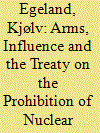

|
|
|
|
|
| Summary/Abstract |
The TPNW challenges the legitimacy of nuclear deterrence, but it would not eliminate deterrence in practice.
|
|
|
|
|
|
|
|
|
|
|
|
|
|
|
|
| 3 |
ID:
092622
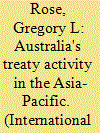

|
|
|
|
|
| Publication |
2009.
|
| Summary/Abstract |
This paper investigates Australian treaty making with neighboring countries in the Asia-Pacific. Patterns of Australian treaty making with South East Asian countries are markedly different to those with South West Pacific countries and the difference is continuing to deepen. Treaties with the former are primarily bilateral and commercially oriented, whereas those with the latter are plurilateral and oriented to natural resources management and development. There is a major gap in Australian subregional treaty activity for natural resources management in South East Asian countries. A coalescence of issues in the law enforcement and security categories is occurring and the new direction in Australian regional treaty making for both subregions is to strengthen capacity to enforce the rule of law in national legal systems. Commercial treaty making remains and is likely to continue to be the strongest area of treaty activity.
|
|
|
|
|
|
|
|
|
|
|
|
|
|
|
|
| 4 |
ID:
084182
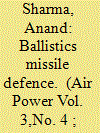

|
|
|
| 5 |
ID:
098785
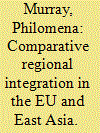

|
|
|
|
|
| Publication |
2010.
|
| Summary/Abstract |
In comparative regional integration (RI) analysis, the European Union's (EU) advancing of its own experience as a model is a significant problem. This article explores this problem by focusing on comparative aspects of RI in the EU and East Asia. It argues that there are important and valid aspects of comparison, such as the origins and objectives of these two regions, but fewer points of comparison between the two when it comes to achieving their objectives. It suggests that historical differences between the two regions constitute the major reason that a direct comparison is neither useful nor productive. It analyses the centrality and the exceptionalism of the EU in much of the comparative RI literature. It agues that the promotion of the EU experience as a form of model or paradigm is far from analytically helpful - the method of comparative analysis needs be the focus of our study as much as the objects of comparison. The article examines how the centrality of the EU in some analysis can amount to a form of de facto snobbery in the positioning of the EU on a rather unsteady pedestal. This 'integration snobbery' - to coin a phrase utilized by an EU official - is not constructive for comparative analysis of the EU and East Asia.
|
|
|
|
|
|
|
|
|
|
|
|
|
|
|
|
| 6 |
ID:
013337
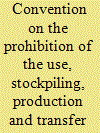

|
|
|
|
|
| Publication |
Sept 1997.
|
| Description |
13-18
|
|
|
|
|
|
|
|
|
|
|
|
|
|
|
|
| 7 |
ID:
149132


|
|
|
|
|
| Summary/Abstract |
Who supports multilateral treaties and who does not? We offer a systematic account of treaty ratification patterns paying particular attention to different states' roles in international legal cooperation in relation to the United States' ratification behavior. States' ability to influence the terms of treaties and their acceptance increases their incentives for treaty ratification. Multilateral powers—states that are powerful and independent from the United States—support multilateral legal cooperation because it offers them an opportunity to shape treaty content. Their engagement in multilateral treaties is strongest when the United States does not lead. States that are weak and/or dependent cannot greatly affect treaties and are therefore less supportive of them but are subject to US pressure. An empirical analysis of states' decisions to ratify prominent postwar multilateral treaties covering a wide range of global issues supports our argument.
|
|
|
|
|
|
|
|
|
|
|
|
|
|
|
|
| 8 |
ID:
141233


|
|
|
|
|
| Summary/Abstract |
It is well recognized that military alliances can provide their members with important security benefits. However, less attention has been paid to the policy concessions states must grant others to enter into military alliances. To study this aspect of alliances, I develop a three-actor bargaining model of alliance formation that endogenizes both external threat and policy concessions. Specifically, a target state bargains with a potential defender over the concessions it must make to ally and then responds to a potential challenger. The model suggests that what is important for policy concessions in alliances is not just the power of the threatened state but its power relative to its challenger and how an alliance will change the distribution of power. I test implications of this model using data on promised policy concessions formalized in alliance treaties and find strong support for the hypotheses. More specifically, I find that states are willing to make more concessions in exchange for an alliance when they are unlikely to defeat their challengers alone and when their allies have a large effect on their probability of winning in war. These findings refine existing theories of alliances and offer the first large-N analysis of policy concessions in alliances.
|
|
|
|
|
|
|
|
|
|
|
|
|
|
|
|
| 9 |
ID:
069397
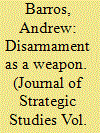

|
|
|
| 10 |
ID:
105108
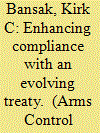

|
|
|
| 11 |
ID:
096954


|
|
|
|
|
| Publication |
2010.
|
| Summary/Abstract |
The Lisbon Treaty sets ambitious goals for the Union in the field of external relations, but makes limited changes in the pursuit of these goals. The role of the High Representative is reinforced and an External Action Service will be set up, but decisions on the common foreign and security policy are still to be taken by consensus. The Representative and the Service will seek to facilitate the emergence of such consensus and to increase the effectiveness of its external implementation. But this can only be a gradual process, the success of which will depend largely upon the continuing political will of the member states.
|
|
|
|
|
|
|
|
|
|
|
|
|
|
|
|
| 12 |
ID:
170630
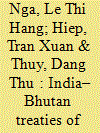

|
|
|
|
|
| Summary/Abstract |
This article is an attempt to relook at the treaties of 1949 and 2007 between India and Bhutan and argues that the 2007 Treaty is the outcome of the evolution and maturity of Bhutan as an independent and sovereign state, that it is imperative for India to make constant adjustments in its foreign policy towards Bhutan to secure its influence in the tiny but important country and maintain the strength of India–Bhutan bilateral relations. From the side of Bhutan, it is also important to have an ‘alliance shelter’, and India is best suited to meeting Bhutan’s needs for political, economic, societal and strategic shelter.1 By using a historical approach, this article shows why it was necessary for the two countries to renew the 1949 Treaty in the first decade of the twenty-first century. The article uses historical methodology, in combination with interdisciplinary methods such as comparative analysis, generalisation, and expert interviews. Major sources for the paper include the texts of the Treaties, speeches by political leaders and published articles and books by international writers, including writers from India, Bhutan and Vietnam.
|
|
|
|
|
|
|
|
|
|
|
|
|
|
|
|
| 13 |
ID:
072284


|
|
|
|
|
| Publication |
New Delhi, Deendayal Research Institute, 1972.
|
| Description |
x, 300p.
|
|
|
|
|
|
|
|
|
|
|
|
Copies: C:1/I:0,R:0,Q:0
Circulation
| Accession# | Call# | Current Location | Status | Policy | Location |
| 021756 | 341.026654047/GHA 021756 | Main | On Shelf | General | |
|
|
|
|
| 14 |
ID:
085299
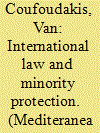

|
|
|
|
|
| Publication |
2008.
|
| Summary/Abstract |
In this essay a largely forgotten human rights issue involving the fate of the Greek-in-origin population that inhabited the Turkish islands of Imbros and Tenedos is examined. Exempted from the Greek-Turkish population-exchange agreements concluded following the end of World War I, the Greek population of the two islands was granted specific civic, cultural, and religious rights by the 1923 Treaty of Lausanne. The treaty remains valid to this day. Turkey deliberately violated the rights of this population because of its ethnicity, religion, and language. The author analyzes the methods used by Turkey to ethnically cleanse the two islands and the options available to the former residents of these islands as well as to the governments of Greece and Turkey to resolve the documented violations of the Treaty of Lausanne and of the European Convention on Human Rights.
|
|
|
|
|
|
|
|
|
|
|
|
|
|
|
|
| 15 |
ID:
142593
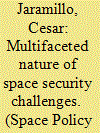

|
|
|
|
|
| Summary/Abstract |
The challenges facing the space domain are multifaceted and there need not be an expectation that they all be covered by a single initiative. Accordingly, no single space policy proposal will effectively address all challenges to the sustainability of outer space—from environmental to commercial to military. Should one of the existing proposals be adopted, it can make a concrete contribution to space governance, in particular if its adoption is not taken as an end goal that jeopardizes the pursuit of further complementary initiatives.
|
|
|
|
|
|
|
|
|
|
|
|
|
|
|
|
| 16 |
ID:
088929


|
|
|
|
|
| Publication |
2009.
|
| Summary/Abstract |
The La Plata River Basin in South America, whose waters are shared by Argentina, Bolivia, Brazil, Paraguay and Uruguay, provides important lessons from the long history of negotiations over its shared water and other natural resources. In particular, innovative resource management practices developed over time have led to the relative harmony in which the riparian countries coexist. In this article, we analyze negotiation techniques within the La Plata River Basin by examining in detail the processes leading to the two seminal agreements - the 1969 Treaty of La Plata Basin and the 1979 Itaipú-Corpus Agreement. Based upon our analysis of the complex and often contradictory relationships between the riparian states, we evaluate the outcomes of both treaties from the standpoint of cooperation in the region and sustainable development. In doing so, we extend the relevance of the analysis to other basins with similar issues of regional management. The article extends the basin cooperation, through negotiation, to include trade agreements and development via project partnerships that draw in regional and global actors, including non-governmental organizations, environmental lobbies in foreign countries, and multinational development banks. The above actors are relevant for many parts of the world in today's era of globalization.
|
|
|
|
|
|
|
|
|
|
|
|
|
|
|
|
| 17 |
ID:
013186
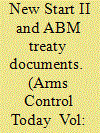

|
|
|
|
|
| Publication |
Sept 1997.
|
| Description |
19-24
|
|
|
|
|
|
|
|
|
|
|
|
|
|
|
|
| 18 |
ID:
093555
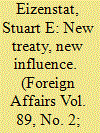

|
|
|
| 19 |
ID:
191979


|
|
|
|
|
| Summary/Abstract |
Incidents of noncompliance with existing multilateral arms-control treaties and subsequent enforcement actions can help to inform the design of future treaties. This article uses examples of noncompliance with the 1972 Biological and Toxin Weapons Convention, 1993 Chemical Weapons Convention, and 1968 Treaty on the Non-Proliferation of Nuclear Weapons to identify factors that have determined the nature of compliance-enforcement actions. The punitivist model of treaty design and enforcement is introduced and is used alongside the established transformationalist and managerialist models to analyze incidents of noncompliance and identify factors shaping compliance-enforcement actions. Two such factors are found to play important roles: the scale of acts of noncompliance and the identity of the perpetrator. The scale of the act of noncompliance dictates whether the compliance-enforcement actions specified in the treaty text are followed. Responses to large-scale acts do follow the treaty-specified actions, while the small-scale acts analyzed in this article all elicit a managerialist response of consultation and cooperation, regardless of actions stipulated in the treaty text. In all cases, the identity of the perpetrator is crucial: the permanent members of the UN Security Council and their allies are fundamentally impervious to punitive measures.
|
|
|
|
|
|
|
|
|
|
|
|
|
|
|
|
| 20 |
ID:
107902


|
|
|